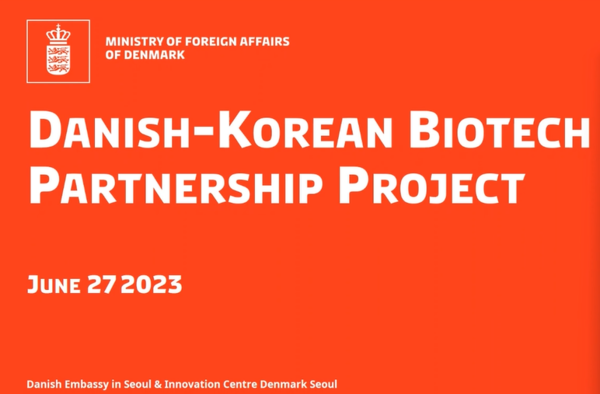As Korea and Denmark are both actively pursuing initiatives to grow their respective biotech industries, the Danish embassy in Seoul hosted a webinar on Tuesday to elaborate on the upcoming Denmark-Korea Biotech Partnership Project.

The project seeks to establish connections between Danish and Korean small and medium-sized enterprises (SMEs) to enhance investment and research and development (R&D) prospects in the biotech and biopharma sector. This initiative will culminate in a Danish delegation visit during Korea Life Science Week 2023, scheduled for Nov. 14-16.
Interested participants from start-ups in Korea and Denmark attended the webinar where the detailed schedule was revealed including further stakeholder meetings, webinars, and presentations from Contera Pharma, a Danish biotech with an affiliate in Seoul.
With companies like Novo Nordisk, Lundbeck, and LEO Pharma coming out of the Nordic country, Denmark’s top 3 strengths were highlighted -- oncology, neuroscience and immunology, and infectious disease.
Particularly in oncology where most of the start-ups are currently focused, there are 150 products in development with 50 percent in phase 2 and approximately 15 percent in "phases 3 and 4."
In particular, Novo Nordisk was noted as a key player in the development of the Danish life science ecosystem investing more than the government.
“Novo Nordisk has said publicly that they owe its success and foundation of the company to the excellent scientific environment in Copenhagen,” explained Tine Hartmann Nielsen, Chief Advisor, Invest in Denmark.
This is one of the reasons why they are putting so much funding back into the Danish science ecosystem which now amounts to more than the public funding from the Danish government itself, she noted.
She also mentioned that Novo Nordisk's BioInnovation Institute (BII), a life science incubator in Denmark, invested in a start-up from the Technical University of Denmark and Copenhagen University where they found a solution to use enzymes to break down the toxins that are associated with alcohol.
She highlighted the importance of this research particularly for Asia because 40 percent of the population has a genetic predisposition to this gene which can lead to a serious reaction with just a small amount of alcohol consumption.
In the life sciences sector, biotech contributes more than half of exports, she added.
The Danish government has seen interest from Japanese companies such as Fujifilm and Asahi Glass Company (AGC) to build CDMO production capacities in Denmark.
Jens Nielsen, CEO of BII, also highlighted the incubator program which is largely funded by the Novo Nordisk Institute, with almost half a billion euros pledged over 10 years.
Nielsen said that the incubator was started as Novo Nordisk noted that too little innovation was coming out of the research it was funding at Danish universities.
“Most companies come from Danish universities and hospitals but about 25 percent of the incubated companies come from other European countries,” he said.
However, he noted that while they do get applicants from Asian countries, it is often difficult to accept these companies due to the strict requirement to have a company presence in Copenhagen to help build the city’s bio-ecosystem.
He stated, “We are currently developing a virtual incubation model that would allow easier incubation across borders using the same program."

